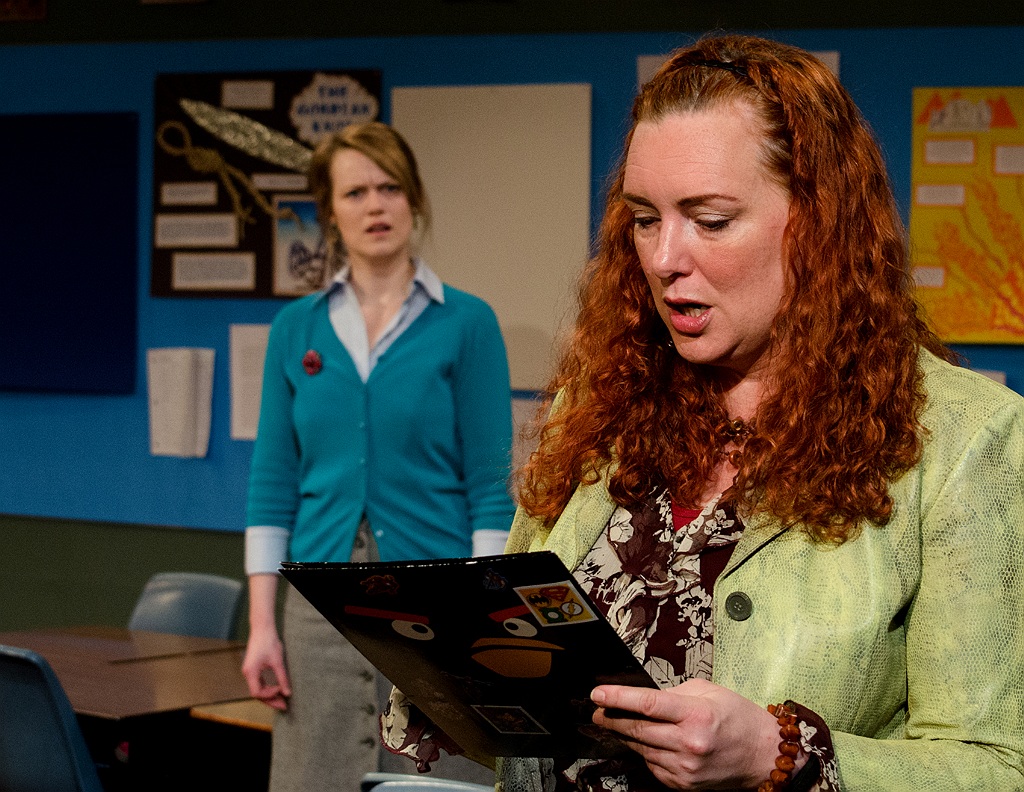
Theatrical Impression: Gidion’s Knot at Seattle Public Theater
April 2, 2014Rebecca Olson and Heather Hawkins in Gidion’s Knot. Photo by Paul Bestock.
My neighborhood theatre with the best view–Seattle Public Theater at the bathhouse on Green Lake–is producing Gidion’s Knot by Johnna Adams. This play has thrown me and my perceptions for a loop this past week, and I love it. Regardless of what I perceived was wrong about the script or whatever, I think it’s important for Seattle audiences to see this play. Rebecca Olson (the teacher) and Heather Hawkins (simply amazing as the mother) landed a fantastic opening night and the play runs for three more weekends. But even a terrific acting performance can skew my perceptions of a script that is convoluted and confusing at times.
Strong, Immersive Staging
First off, the staging and set design were fantastic. See this play and sit right up close to get the experience. It’s worth it. I was sitting right next to the only entrance, behind the teacher’s desk. I felt like a fly on the wall, like I was actually in the 5th grade classroom and able to observe the scene between Gidion’s mother and teacher as they discussed Gidion’s fate and untimely demise.
Being immersed in the staging meant I not only had to be an accountable audience member (tuck my legs in, look attentive), but it also meant that when the mother would speak to the teacher, it was like she was speaking directly to me. I was also close to the impeccable set dressings. Ashley Banker (props designer) made exquisite posters about mythology and put other detailed touches on the set that were a fun visual game to look at.
Also, the staging was well done. I was sitting in what could have been considered a very bad seat, and it just wasn’t. Both actresses were aware of their sight lines, staying visible as they warred from separate sides of the classroom. The shape of the stage Seattle Public allows the producers play with traditional theatre in a non-traditional way. Doing a play that could very well be done in a proscenium stage in a nearly three-quarter set-up was a strong choice and served the play well. I like the contrast between the hyper-realism of being in a classroom and the hyper-awareness that we are all here, watching a play.

Honesty, Truthfulness, The Truth
Although the script encourages verisimilitude–the play is even held accountable to real time by a clock on the wall–there were moments that made me question the plausibility of the premise. The timeline is a bit complicated to grasp because it is explained throughout the entire play, but Gidion’s mother missed the open house, then Gidion was suspended for 5 days for a reason not communicated to her, she was asked to make a separate parent-teacher conference, he committed suicide, then she followed up on her appointment, which is the play. So Gidion’s offense was committed in between the missed parent-teacher night, but the teacher made no effort to actually tell the mother what happened? She sent the son home with a vague note and left a cryptic voice mail about a 5 day suspension without explanation? How does that work? I spent a lot of time thinking about what offense Gidion could have committed to warrant such an offense (something the playwright obviously wants the audience to do) but when I found out the true offense, I became distracted because it seemed so minor.
When we find out why was Gidion was suspended–he wrote a graphic story detailing grotesque violence against his school teachers and another student–the teacher nor the mother never bring up that he or another student could have potentially committed violence similar to what’s described in the story. Why not? Why else would the teacher suspend Gidion? Another plot point is that the teacher assumed the meeting was cancelled because the student in question died. Why did she ever think she wouldn’t even be asked to talk about what happened, even if it’s no longer about the severe discipline she administered?
Which Side Are You On?
I found myself drawn to the mother from the very beginning. She spoke eloquently at length and made perceptive statements about the situation at hand. I was inclined to believe her. As it became more and more apparent that she doesn’t always know the truth about everything, I noticed that she is the mouthpiece for the playwright. Also, her two bursts of near-violence seemed unwarranted and out of place. She’s rightly infuriated, yes, but if the play truly is a two-hander happening in real time, wouldn’t it be great if the teacher had equal weight in her arguments? Then it truly would be a play about two starkly contrasting opinions about how to deal with a student who could either be a serious problem child or an under-nourished genius.
Adams uses the excuse of the teacher wanting the principal to be present for the discussion to enable the mother to go on tirades of righteousness and guessing games while keeping the teacher mute. Although it’s highly realistic that the teacher would wait until another authority is present, it doesn’t make for good dialogue. The result is a play about a character who has the free reign to say whatever she pleases, telling off the other character who has been told to sit down and listen to what’s “right.” As the audience, we are now subjected to what the playwright (with the mother as her proxy) thinks is the way children should be dealt with in school when they express themselves.

Go See the Play
Once I knew I was seeing Gidion’s Knot, I popped over to SPT’s YouTube Channel to watch their dramaturgical video interviews. They’re all great. All of the interviewees talk about the issues of the play in a way I wish were given more weight in the script. Adams starts from the assumption that children are being stifled in their self-expression in a culture of fear. And maybe they are, but shouldn’t the other side get a chance to argue the point? But don’t take my word for it. Go see this play. Go see it, then talk about it. (SPT is hosting talkbacks after some performances.) The strongest result from Johnna Adams’s play is that she has sparked a fantastic starting point for a conversation about a difficult topic fraught with complications. It’s fantastic. Gidion’s Knot plays Thursdays-Sundays until April 20.
Categorized in: Live Performance, Performance Reviews

